'Too many children did not make it home': Anniversary of discovery at Canada's largest residential school
Warning: This article contains disturbing details. Reader discretion is advised.
It's been a year since the announcement of the detection of unmarked graves at the site of what was once Canada's largest residential school – an announcement that for many Indigenous survivors was confirmation of what they already knew.
A daylong memorial brought dozens to Kamloops, B.C., Monday to mark the anniversary as work continues at the site, and to honour the children who never made it home.
A sunrise ceremony was held on the Tk'emlúps te Secwépemc powwow grounds, not far from the former Kamloops Indian Residential School.
It began with an opening prayer, and included an emotional speech from Kukpi7 (Chief) Rosanne Casimir.
"What scientific investigation confirmed were the truths about our survivors and what they've always known," she said.
"Too many children did not make it home."
PRIME MINISTER ATTENDS CEREMONY
The day to honour children who were taken from their homes and never made it back included cultural performances, dances, drumming and speeches, and closed with an evening prayer, attended by Prime Minister Justin Trudeau.
Introducing Trudeau, Casimir noted both the pain and resilience of residential school survivors, their families and their communities.
"We have been damaged by the attack on our language and our culture arising from the forced removal of our children. We know those harms, but we also know what we're doing to revitalize that," she said.
Stressing the need for all levels of government to support and advance the work of reconciliation, Casimir said she hopes to see continued, concrete action.
Addressing those gathered, Trudeau faced some angry chants before proceeding with his remarks.
"I'm here with a simple message. We're here for you. We'll continue to remember the children who never returned and to support one another as we walk forward together on the shared path of reconciliation," he said.
"Some of the children who went missing would have been grandparents, great-grandparents. They would have been elders, knowledge-keepers and community leaders. It is on all of us to remember them and to honour them. As we look to build a better future together, it's on all of us to work together to make sure that every First Nation Inuit and Metis child grows up safe, proud of who they are."
'LIKE A WOUND BEING REOPENED'
Casimir said it's been a year of pain for some, describing the announcement made one year ago as "like a wound being reopened," but that it's also an opportunity for healing.
She said science will support the next steps, but that the Tk'emlúps te Secwépemc First Nation is taking time, knowing the impact the investigation has on the community.
Casimir also noted the impact the discovery had on those outside the community, encouraging non-Indigenous people to want to learn more about Canada's hidden history.
"The unmarked graves brought truth to the world, and the world stood with us in solidarity and unity," she said.
Gov.-Gen. Mary Simon was at the sunrise ceremony, and said, simply, "You knew. You've known for so long."
Addressing survivors and their relatives, she said that the investigation has been called a discovery, but it's confirmation.
"You knew what happened here, the atrocities, the deaths, the loss. And the silence … And now everyone knows. It shouldn't have taken this long, but finally, people know."
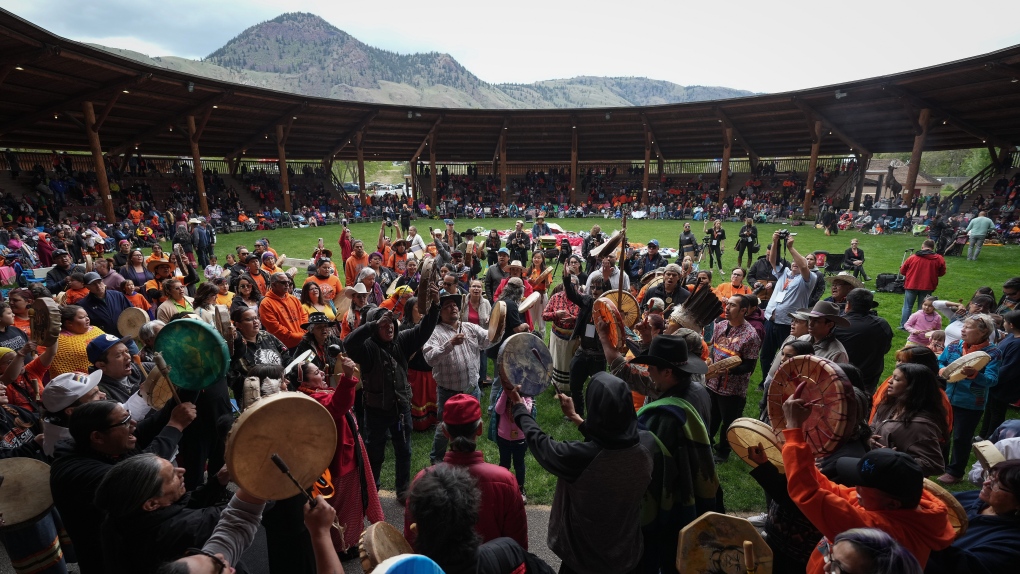 Drummers play and sing during a ceremony to mark the one-year anniversary of the announcement of the detection of the remains of children at an unmarked burial site at the former Kamloops Indian Residential School, in Kamloops, B.C., on Monday, May 23, 2022. THE CANADIAN PRESS/Darryl Dyck
Drummers play and sing during a ceremony to mark the one-year anniversary of the announcement of the detection of the remains of children at an unmarked burial site at the former Kamloops Indian Residential School, in Kamloops, B.C., on Monday, May 23, 2022. THE CANADIAN PRESS/Darryl Dyck
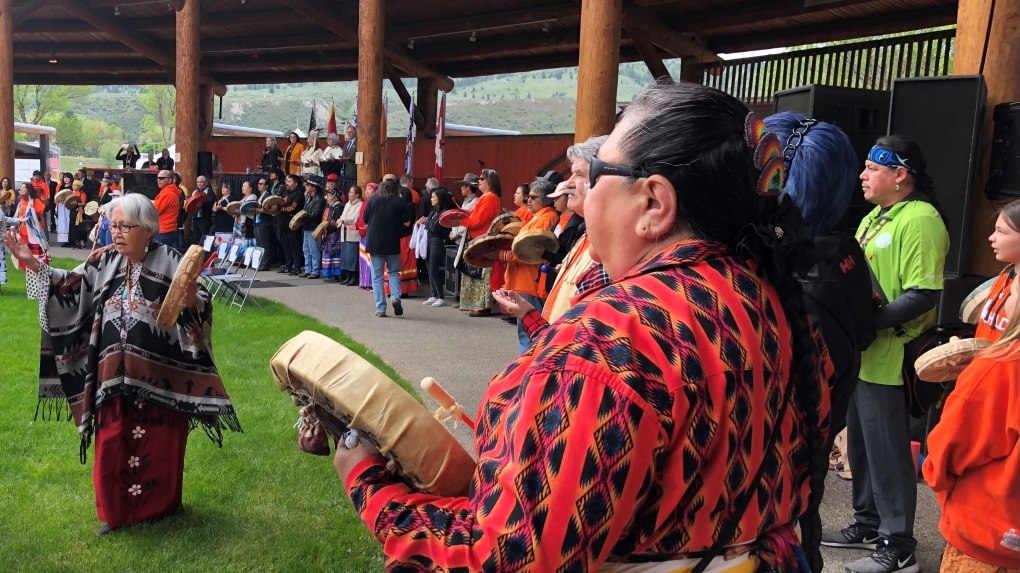 (Ben Miljure / CTV News Vancouver)
(Ben Miljure / CTV News Vancouver)
DETAILS ON THE SEARCH
The search area was in part determined by the discoveries of a child's rib bone and a youth's tooth, and is the site of what was once an apple orchard, when the school was in operation.
Sarah Beaulieu, a professor at the University of the Fraser Valley and member of the search team, described what she found as "targets of interest" when outlining the technical side of the investigation last July.
While the only way to confirm what is in the graves is exhumation, according to experts behind the detection, the discovery matched stories from survivors of the school, some of whom described being woken up in the middle of the night to dig graves in the orchard.
Some of those children were as young as six.
Currently, the focus of the ongoing investigation in the Kamloops area is not excavation and forensic analysis but the search through ground-penetrating radar of the rest of the site, as only a small area of the grounds were examined in the initial study.
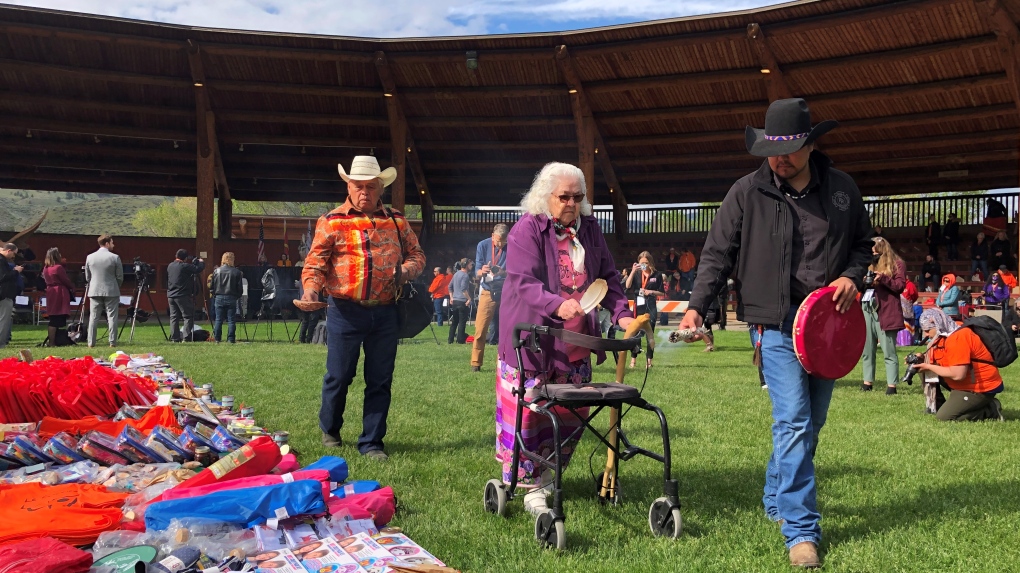 (Ben Miljure / CTV News Vancouver)
(Ben Miljure / CTV News Vancouver)
SURVIVORS' STORIES
One of the people who attended the school as a child is Clayton Peters, who told The Canadian Press it was "the most horrible pain in the world to be a native, to be an Indian back then."
He and his brothers attended the Kamloops school in the late 1960s, into the 1970s, and said he remembers thinking that the kids who suddenly disappeared were the lucky ones.
"I'd always thought that they ran away like I did, that they made it, that they were free," he said, crying. Now he thinks some of those children's remains may be among those hidden under the orchard.
Before he was kicked out at the age of 17, Peters said, he was regularly beaten and molested. Children who spoke their own language were made to eat soap, he said, and they were also forced to scrub their bodies with lye to "take the brown off them."
When children fell ill, he said, they were put in a dark room rather than given treatment. The room was also used as punishment.
"I was sad all my life. When I left that school, I fought everybody. I fought every white man that bumped into me. I was so angry," he said.
Another survivor is Ron Ignace, who told CTV News last year he'd been beaten for speaking his mother tongue, but that he refused to abandon the Secwepemctsin language entirely.
"I thought in Secwepemctsin and spoke in English, knowing full well that they could not beat me for what I thought," he said in an interview on the first National Day for Truth and Reconciliation.
He ran away during a leave on his 16th birthday, and said he's living proof that the school system failed its goal, described by the Truth and Reconciliation Commission as a campaign of cultural genocide.
And what happened back then had a lasting impact.
"This is a heavy truth. It has been referred to as a historic dark chapter but Indigenous people are very much alive with the repercussions that they're living today," Kukpi7 Casimir said back in July.
It's important to remember that the Kamloops school is only one of 139 in the system.
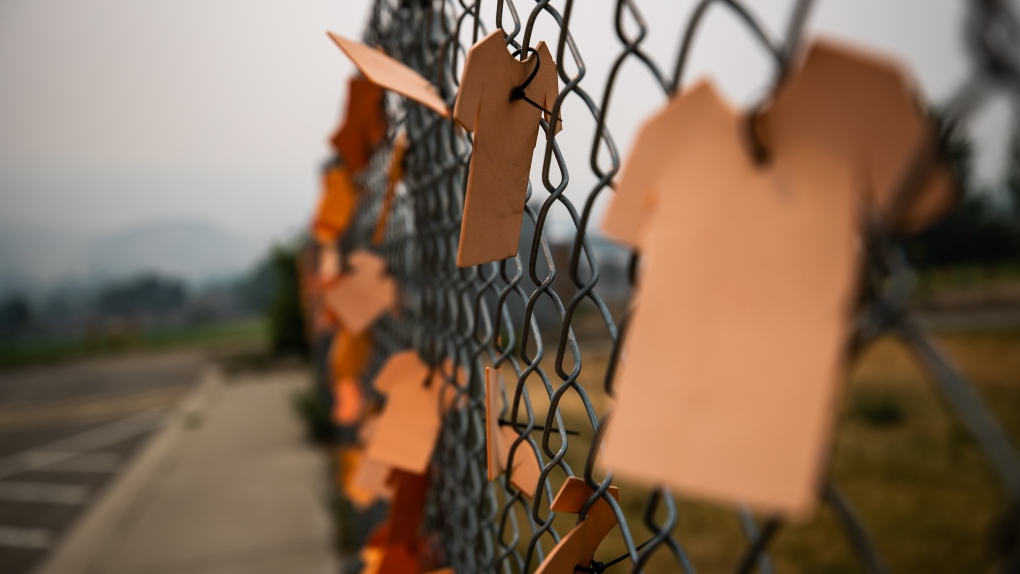 Cutouts of orange T-shirts are hung on a fence outside the former Kamloops Indian Residential School, in Kamloops, B.C., on Thursday, July 15, 2021. (Darryl Dyck / THE CANADIAN PRESS)
Cutouts of orange T-shirts are hung on a fence outside the former Kamloops Indian Residential School, in Kamloops, B.C., on Thursday, July 15, 2021. (Darryl Dyck / THE CANADIAN PRESS)
DISCOVERIES ACROSS CANADA
Many spoke about deaths and disappearances of children who attended the school, and other residential schools in Canada.
The Kamloops discovery marked a year of further investigations at school grounds across the country, and calls for truth, acknowledgment and apologies from both the Canadian government and the Catholic Church, which operated many institutions in the residential school system.
The Pope issued an apology earlier this year, and is planning a trip to Canada in the summer that will involve visits to First Nations communities, though none in British Columbia.
Casimir included in her opening remarks a thank you to members of the church, including a local bishop who's committed to working with Indigenous peoples towards reconciliation.
"We know that many of our people still practice Catholicism. We all need to have faith, we all need to have hope, we all pray to the one creator, the one god."
With files from CTV News Vancouver's Ben Miljure in Kamloops, B.C., Lisa Steacy, and The Canadian Press
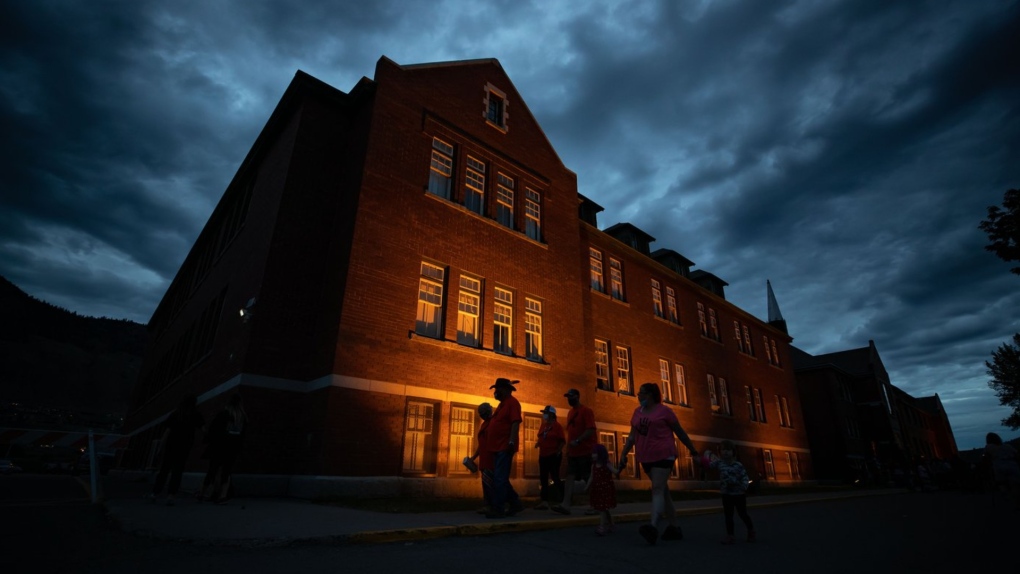 People are silhouetted as they walk past the former Kamloops Indian Residential School after gathering to honour the 215 children whose remains are believed to be buried near the facility, in Kamloops, B.C., on Monday, May 31, 2021. The year since the the Tk'emlups te Secwepemc First Nation announced that ground-penetrating radar had located the suspected grave sites in a former apple orchard has been one of national reckoning about residential schools in Canada. THE CANADIAN PRESS/Darryl Dyck
People are silhouetted as they walk past the former Kamloops Indian Residential School after gathering to honour the 215 children whose remains are believed to be buried near the facility, in Kamloops, B.C., on Monday, May 31, 2021. The year since the the Tk'emlups te Secwepemc First Nation announced that ground-penetrating radar had located the suspected grave sites in a former apple orchard has been one of national reckoning about residential schools in Canada. THE CANADIAN PRESS/Darryl Dyck
If you are a former residential school student in distress, or have been affected by the residential school system and need help, you can contact the 24-hour Indian Residential Schools Crisis Line at 1-866-925-4419, or the Indian Residential School Survivors Society toll free line at 1-800-721-0066.
Additional mental-health support and resources for Indigenous people are available here.
CTVNews.ca Top Stories

Quebec nurse had to clean up after husband's death in Montreal hospital
On a night she should have been mourning, a nurse from Quebec's Laurentians region says she was forced to clean up her husband after he died at a hospital in Montreal.
Northern Ont. lawyer who abandoned clients in child protection cases disbarred
A North Bay, Ont., lawyer who abandoned 15 clients – many of them child protection cases – has lost his licence to practise law.
Bank of Canada officials split on when to start cutting interest rates
Members of the Bank of Canada's governing council were split on how long the central bank should wait before it starts cutting interest rates when they met earlier this month.
Maple Leafs fall to Bruins in Game 3, trail series 2-1
Brad Marchand scored twice, including the winner in the third period, and added an assist as the Boston Bruins downed the Toronto Maple Leafs 4-2 to take a 2-1 lead in their first-round playoff series Wednesday
Cuban government apologizes to Montreal-area family after delivering wrong body
Cuba's foreign affairs minister has apologized to a Montreal-area family after they were sent the wrong body following the death of a loved one.
'It was instant karma': Viral video captures failed theft attempt in Nanaimo, B.C.
Mounties in Nanaimo, B.C., say two late-night revellers are lucky their allegedly drunken antics weren't reported to police after security cameras captured the men trying to steal a heavy sign from a downtown business.
What is changing about Canada's capital gains tax and how does it impact me?
The federal government's proposed change to capital gains taxation is expected to increase taxes on investments and mainly affect wealthy Canadians and businesses. Here's what you need to know about the move.
New Indigenous loan guarantee program a 'really big deal,' Freeland says at Toronto conference
Canada's Deputy Prime Minister Chrystia Freeland was among the 1,700 delegates attending the two-day First Nations Major Projects Coalition (FNMPC) conference that concluded Tuesday in Toronto.
'Life was not fair to him': Daughter of N.B. man exonerated of murder remembers him as a kind soul
The daughter of a New Brunswick man recently exonerated from murder, is remembering her father as somebody who, despite a wrongful conviction, never became bitter or angry.






























